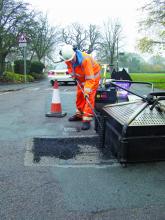A huge leap in highway investment, more privately-run toll motorways and a stronger road industry lobby would all be welcomed by Christopher Chope, chairman of the UK’s highway maintenance all-party parliamentary group. Speaking exclusively to World Highways at the PPRS Paris 2015 pavement preservation and recycling summit, Chope said “yes, I would very much like to have a lot more capital investment in the roads sector. There are still too many pinch points out there … where one motorway meets another for
More investment is needed in roads to tackle maintenance and provide capacity expansion
RSSA huge leap in highway investment, more privately-run toll motorways and a stronger road industry lobby would all be welcomed by Christopher Chope, chairman of the UK’s highway maintenance all-party parliamentary group. Speaking exclusively to World Highways at the 7924 PPRS 2015 pavement preservation and recycling summit, Chope said “yes, I would very much like to have a lot more capital investment in the roads sector. There are still too many pinch points out there … where one motorway meets another for example.”
And we have to invest quickly. “There are no serious alternatives to roads.”
Chope worries that progress is slow because “the road lobby has always been weak.” It is too fractured and it doesn’t pull together. The former transport minister is dismayed when he sees how strong and influential other lobby groups can be.
“The road groups are poor when compared with other competing transport modes like rail,” he says, “and when the environmentalists get on the rail band-wagon” … the road argument gets drowned out.
Former UK prime minister Margaret Thatcher had a “Roads for Prosperity” programme that understood the link between a high quality and well-maintained highway network and the socio-economic benefits that it brought. He would like to see a similar initiative come back into the political landscape today.
“I see roads as a vital asset” Chope says. “We have got to look after our roads and preserve them properly. The existing highway system in any successful economy should be fit for purpose.” He welcomed the PPRS Paris summit and is hopeful that one of its outcomes will be that the world highways sector tries much harder in the years to come to “ensure that the political classes are responding to the needs of their road users.”
The alternative is a continuing decline in our road networks and economies in chaos. And voters are starting to get annoyed. Recent surveys in the UK have revealed that the deteriorating state of the country’s roads are causing high levels of concern in the electorate. “The politicians need to listen and respond,” says Chope. “In the UK it only used to be the Liberal Democrats who made a big issue of potholes in the roads. Now it is a national issue. Accidents are increasing. That means we have to spend on compensating accident victims. People suffer. The health service is put under unnecessary pressure and the insurance companies are starting to get seriously concerned.”
“Surely we can show that it is better to borrow now and maintain our road assets than defer and end up spending more later,” he adds. “That has got to make good economic sense.”
Chope welcomes the UK’s recent 5-year £1 billion local roads programme and he wants to see more long-term schemes being put into place. He still worries however, that “politicians like the glamour of announcing and opening big new projects.”
Maintenance is not glamorous and doesn’t grab the headlines. That is one of the problems. Nobody wins votes for being sensible and well planned.
Should Europe move towards the user pays principle? “Philosophically yes,” Chope says. “Realistically no. Road users already pay more through their taxes than they get back. Why would people want to pay as you go and get nothing back.” It is a policy plan that needs far more thought and a clearer way of demonstrating what is being reinvested back in the road network, and how. The only way he can see it working in the medium-term is for counties like the UK to develop more tolled motorways along its strategic routes. “That is something have I believed in for years,” he says.
And we have to invest quickly. “There are no serious alternatives to roads.”
Chope worries that progress is slow because “the road lobby has always been weak.” It is too fractured and it doesn’t pull together. The former transport minister is dismayed when he sees how strong and influential other lobby groups can be.
“The road groups are poor when compared with other competing transport modes like rail,” he says, “and when the environmentalists get on the rail band-wagon” … the road argument gets drowned out.
Former UK prime minister Margaret Thatcher had a “Roads for Prosperity” programme that understood the link between a high quality and well-maintained highway network and the socio-economic benefits that it brought. He would like to see a similar initiative come back into the political landscape today.
“I see roads as a vital asset” Chope says. “We have got to look after our roads and preserve them properly. The existing highway system in any successful economy should be fit for purpose.” He welcomed the PPRS Paris summit and is hopeful that one of its outcomes will be that the world highways sector tries much harder in the years to come to “ensure that the political classes are responding to the needs of their road users.”
The alternative is a continuing decline in our road networks and economies in chaos. And voters are starting to get annoyed. Recent surveys in the UK have revealed that the deteriorating state of the country’s roads are causing high levels of concern in the electorate. “The politicians need to listen and respond,” says Chope. “In the UK it only used to be the Liberal Democrats who made a big issue of potholes in the roads. Now it is a national issue. Accidents are increasing. That means we have to spend on compensating accident victims. People suffer. The health service is put under unnecessary pressure and the insurance companies are starting to get seriously concerned.”
“Surely we can show that it is better to borrow now and maintain our road assets than defer and end up spending more later,” he adds. “That has got to make good economic sense.”
Chope welcomes the UK’s recent 5-year £1 billion local roads programme and he wants to see more long-term schemes being put into place. He still worries however, that “politicians like the glamour of announcing and opening big new projects.”
Maintenance is not glamorous and doesn’t grab the headlines. That is one of the problems. Nobody wins votes for being sensible and well planned.
Should Europe move towards the user pays principle? “Philosophically yes,” Chope says. “Realistically no. Road users already pay more through their taxes than they get back. Why would people want to pay as you go and get nothing back.” It is a policy plan that needs far more thought and a clearer way of demonstrating what is being reinvested back in the road network, and how. The only way he can see it working in the medium-term is for counties like the UK to develop more tolled motorways along its strategic routes. “That is something have I believed in for years,” he says.







